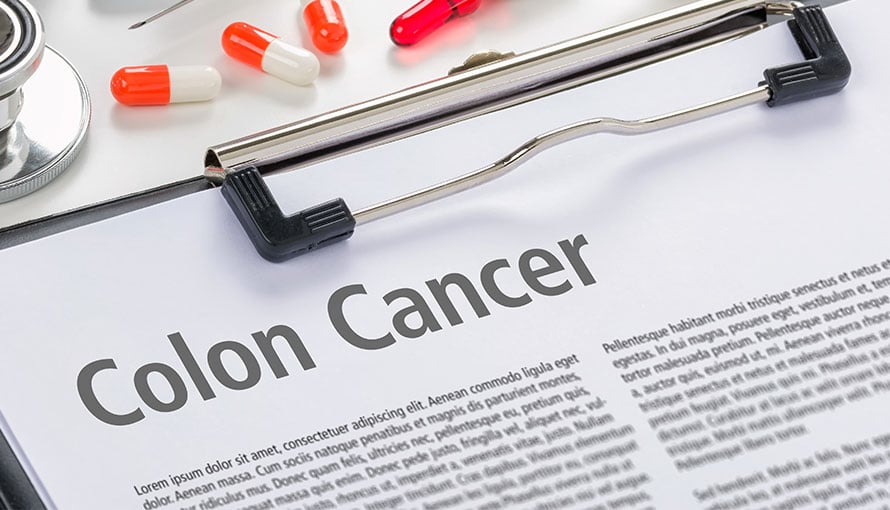Colon Cancer Survival Rate

The colon cancer survival rate is encouragingly high; more than 92 percent of patients diagnosed with stage 1 colon cancer live for at least five years after diagnosis. The survival rates for more advanced stages have been steadily increasing as well, due primarily to the availability of more effective treatment options and an increasingly better understanding of the disease as time goes on.
Contributing factors
While colon cancer survival rate information can help people learn more about the experiences of other patients, the statistics do not take into account the personal factors that can improve a person’s chance of survival. For instance:
- People who participate in regular screenings have a better chance of early detection—and therefore a better chance of survival. It’s estimated that up to 60 percent of all colon cancer-related deaths could be prevented if everyone followed the appropriate recommendations for screening.
- People who are not considered to be good candidates for traditional treatments can expand their range of options by considering clinical trials. Although participation in a clinical trial doesn’t guarantee a higher chance of survival, it does give patients the opportunity to be among the first to benefit from a promising new colon cancer treatment.
- People who seek care from an oncologist—or preferably, a team of oncologists—who have extensive experience in treating the various forms of colorectal cancer often benefit from more individualized treatments. For instance, some treatments that are effective for rectal cancer are less effective for colon cancer, and oncologists who treat many patients with these conditions have a broader experience with these treatments and can design more tailored treatment plans.
How fast does colon cancer spread?
One of the factors that can help determine a colon cancer patient’s chances of survival is how far the malignancy has progressed at the time of diagnosis. As with other types of cancer, the earlier that colon cancer is diagnosed, the better the prognosis will likely be. This is in large part because when colon cancer remains undetected, it has a greater chance of metastasizing (spreading) throughout the body, thereby making the malignancy more difficult to effectively treat. According to the National Cancer Institute’s Surveillance, Epidemiology and End Results (SEER) Program database, the five-year survival rate for localized colorectal cancer (cancer that is confined to the colon or rectum) is 90.6 percent, while the five-year survival rate for distant colorectal cancer (cancer that has spread to distant areas of the body) is 14.7 percent.
Fortunately, colon cancer is relatively slow-growing, with benign (noncancerous) polyps typically taking approximately 10 to 15 years to develop into cancer. During this time, colon cancer often doesn’t produce any noticeable symptoms, which is why it’s so important to attend regular screenings (it’s generally recommended that individuals who are at average risk undergo screenings at least once every 10 years starting at age 45). Once the malignancy has metastasized to another part of the body—colon cancer commonly spreads to the brain, lungs, liver, peritoneum and lymph nodes—it may begin producing symptoms in that distant area. For example, if colon cancer metastasizes to the lungs, it can cause respiratory issues such as shortness of breath and chronic coughing. Or, if colon cancer metastasizes to the liver, it can cause jaundice and nausea.
Treatment options for colon cancer
In many cases, colon cancer is highly treatable. Colon cancer specialists use a variety of methods to treat this malignancy, including:
- Surgery
- Radiation therapy
- Chemotherapy
- Tumor ablation
- Proton therapy
- Targeted therapy
Each of these treatment options presents its own set of risks and benefits, and a colon cancer expert can recommend the course of treatment that’s best suited to your specific needs. When formulating a treatment plan, your physician will likely consider factors such as:
- Your age
- Your overall health
- Your medical history
- The type of colon cancer you have
- The size of any tumors
- Whether the malignancy has spread to other areas of your body
- Your personal preferences
Colon cancer diagnosis and treatment at Moffitt
At Moffitt Cancer Center, we’re committed to continually improving the colon cancer survival rate. We are leaders in the development and assessment of new therapies, offering our patients access to a robust portfolio of clinical trials. Additionally, we have a multispecialty team of surgeons, medical oncologists, radiation therapists and supportive care providers who exclusively treat patients with colorectal cancer. To learn more, call 1-888-663-3488 or submit a new patient registration form online.
When it comes to colon cancer prognosis and treatment, an early diagnosis can make all the difference in the world. At Moffitt, we understand the importance of early detection and treatment, and that’s why we make it a point to provide every new patient with rapid access to a cancer expert. When you turn to Moffitt for colon cancer diagnosis and treatment, you can rest easy knowing that you’ll be a top priority of a cancer center that delivers nationally ranked care in new and transformative ways.
